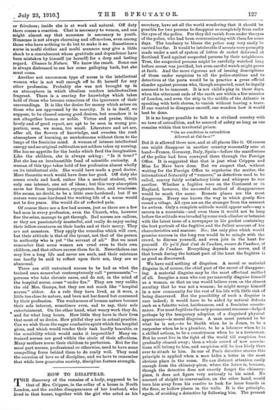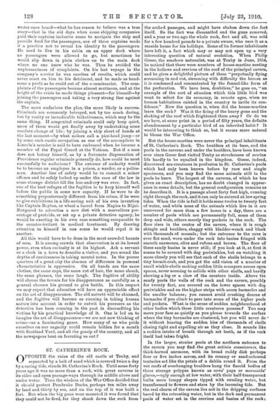HOW TO DISAPPEAR.
THE discovery of the remains of a body, supposed to be that of Mrs. Crippen, in the cellar of a house in North London, and the sudden disappearance of her husband, who lived in that house, together with the girl who acted as his secretary, have set all the world wondering that it should be possible for two persons to disappear so completely from under the eyes of the police. For they did vanish from under the eyes of the police, who had been communicating with them for some days. The tendency to blame the police may very easily be carried too far. It would be intolerable if arrests were promptly made under a sort of system of leitres de cachet delivered at Scotland Yard against suspected persons by their neighbours. True, the suspected persons might be carefully watched long before arrest was justified, but even careful watch might prove at fault. And the more rigorous act of issuing descriptions of those under suspicion to all the police-stations and to detectives at the ports would be in practice a gross official slander against persons who, though suspected, must be legally assumed to be innocent. It is not child's-play in these days, when the uttermost ends of the earth are within a few minutes of London, and even the ship in the middle of the Atlantic is speaking with both shores, to vanish without leaving a trace. If one wanted to disappear oneself, one wonders how it would best be done.
It is no longer possible to bolt to a civilised country with no laws of extradition, and be assured of safety so long as one remains within that territorial prison.
" On no condition is extradition Allowed at Cal-la-o!"
But it is allowed there now, and at all places like it Of course one might disappear in another country reasonably near at hand—France, Germany, Italy, Spain—before the manifestoes of the police had been conveyed there through the Foreign Office. It is suggested that that is just what Crippen and Miss Le Neve have done. But we suspect that, without waiting for the Foreign Office to regularise the matter, the international fraternity of "runners," as detectives used to be called, convey fairly satisfactory hints and whispers to one another. Whether a fugitive were on the Continent or in England, however, the successful method of disappearance would be much the same. Remote places are the most dangerous. Every one knows the way in which gossip flies round a village. All eyes are on the stranger from the moment he arrives. Only a complete solitude would appear safe—say a cavern in a mountain—and even there it would not be long before the solitude was invaded by some rock-climber or botanist with the latest issue of a newspaper in his pocket containing the best portrait of the fugitive and the fullest account of his characteristics and manner. No ; the only plan which would promise success in the long run would be to mingle with the crowd, to discuss yourself, and even join in the hunt for yourself. Ce qu'il fact c'est de l'audace, encore de l'audace, et toujours de l'audace. Everything depends on nerve, and if that break during the hottest part of the hunt the fugitive is as good as discovered.
We have said nothing of disguises. A moral or material disguise is, of course, the chief part of the secret of disappear- ing. A material disguise may be the most effectual method of all Imagine a man who can permanently disguise himself as a woman, so that no one would believe even on the closest scrutiny that he was not a woman ; he might merge himself in a new community for the rest of his life with little risk of being discovered. But the possibility of such a disguise is rare indeed ; it would have to be aided by natural defects such as a falsetto voice, hairlessness, and a feminine counte- nance. For most fugitives the only permanent resource—helped perhaps by the temporary adoption of a disguised physical appearance—is moral disguise. A man must pretend to be what he is not,—to be Smith when he is Jones, to be a carpenter when he is a plumber, to be a labourer when he is a skilled artisan, to be a countryman when he is a townsman. But he must live in the light of the world till suspicion has gradually cleared away; then a whole crowd of new associa- tions will belong to him, and suspicion will be less likely than ever to attach to him. In one of Poe's detective stories this principle is applied when a man hides a letter in the most obvious place in the room. He can distract attention easily enough from the chimney-piece, where the letter is, because, though the detective does not exactly forget the chimney- piece, it does not figure very seriously in his mind. No amount of sleight in conversation, on the other hand, would turn him away from his resolve to look for loose boards in the floor, or hollow places in the walls. It is the principle, again. of avoiding a detective by following him. The present writer once heard—what be has reason to believe was a true story—that in the old days when some shipping companies paid their captains inclusive sums to navigate the ship and provide food for the passengers, one of these captains made it a practice not to reveal his identity to the passengers. He used to live in his cabin on an upper deck where no passengers were allowed to go, but sometimes be would slip down in plain clothes on to the main deck where no one knew who he was. Thus he avoided the unpleasantness of complaints. On his last voyage in the company's service be was careless of results, which could never react on him to his detriment, and he made as hand- some a profit as be could out of the commissariat. The com- plaints of the passengers became almost mutinous, and at the height of the crisis he made things pleasant—for himself—by joining the passengers and taking a very strong line against the captain.
The more audacious the plan, the more likely is success. Criminals are commonly betrayed, not by too much daring, but by vanity or ineradicable talkativeness, which may be the same thing. If congenital criminals could only keep quiet, more of them would get finally away by undertaking some resolute change of life : by joining a ship short of hands at the last moment—by what sailors call a pier-head jump—or by some such exotic occupation as one of the accomplices in Lincoln's murder is said to have embraced when he became a member of the Papal Guard at the Vatican. But if a man does not betray himself, as by a fortunate dispensation of Providence regular criminals generally do, how could he most successfully be audacious P The extreme of audacity would be to become an employee in a prison, a warder, or a police- man. Another line of safety would be to commit a minor offence and be safely locked up under the care of the law in some strange district till the hue-and-cry was over. In fact, one of the best refuges of the fugitive is to keep himself well before the public in some new capacity. If he were to do something preposterously different from his crime, if he were to give exhibitions in a life-saving suit of his own invention like Captain Boyton, or wheel a barrel from Naples to Nijni- Novgorod to advertise a new diet with a marvellous per- centage of proteids, or set up a private detective agency, he would be exerting in his own case something comparable to the counter-irritant in medical treatment. By drawing attention to himself in one sense he would repel it in another.
All this would have to be done in the most crowded haunts of men. It is among crowds that observation is at its lowest power, even when curiosity is at its highest. Ask a servant or a clerk in a town to describe a visitor, and you sound the depths of carelessness in taking mental notes. In the poorer quarters of a great city the absence of difference in personal characteristics is oppressive. On all hands are the same clothes, the same caps, the same cut of hair, the same slouch, the same phrases, the same laugh. The fugitive of ability will choose the terrain for his disappearance as carefully as a general chooses his ground to give battle. In this respect we may expect that education will have an appreciable effect on the art of disappearance. The old naiveté will be shunned, and the fugitive will become as cunning in taking human nature into account in order to outwit his pursuers as the detective has been cunning in the past in discomfiting his victims by his practical knowledge of it. One is led on to imagine the art of disappearance—we are not now thinking of crime—as a fascinating game. How many of us wbo pride ourselves on our sagacity could remain hidden for a month with Scotland Yard, and all the gossip of the country, and all the newspapers bent on ferreting us out ?







































 Previous page
Previous page